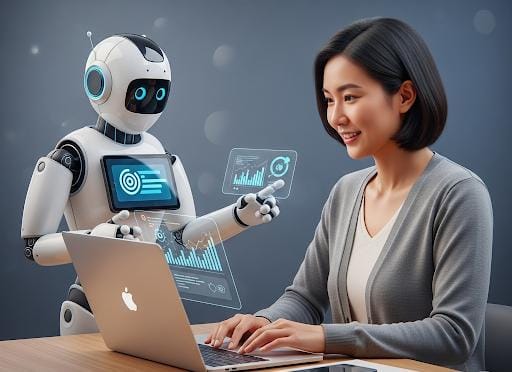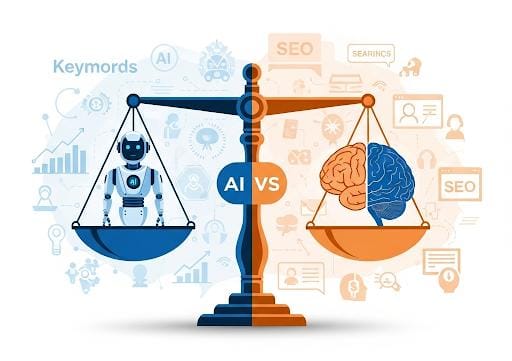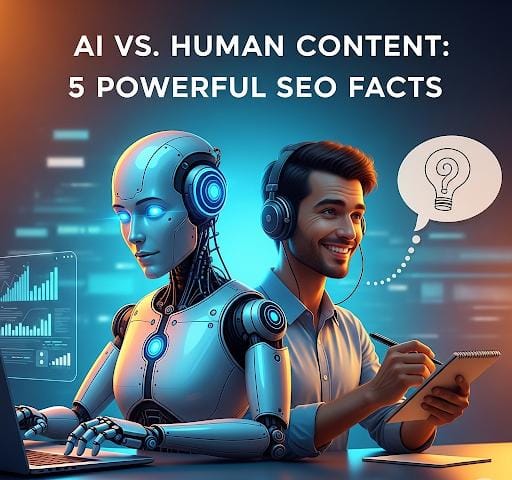Table of Contents
AI vs Human Content has become one of the biggest debates in SEO as we move into 2025, and every blogger wants to know which one Google prefers for better ranking. With smarter algorithms, Google now evaluates content based on value, experience, and authenticity—making the clash of AI vs Human Content more important than ever. Whether you’re new to blogging or already creating content regularly, understanding how both styles work can help you create helpful, high-ranking posts that match Google’s expectations. Tools like ChatGPT and Gemini are faster and smarter than ever, but the human touch still matters. So, learning how to balance both is essential if you want to win at SEO in 2025.
Understanding the Basics: AI vs Human Content
What is AI-Generated Content?
AI content is written by tools like ChatGPT, Jasper, Copy.ai, etc. These tools process huge data sets and generate readable content in seconds.
But with Google ranking in 2025 being more experience-focused, is speed enough?
What is Human-Written Content?
Human content is what you’re reading now—crafted with thought, emotion, tone, and creativity. It tells stories, adds personal experiences, and connects with readers on a real level.

Key Differences Between AI and Human Content
| Feature | AI Content | Human Content |
|---|---|---|
| Speed | Super fast | Slower |
| Emotion | Lacking | Rich and relatable |
| Creativity | Limited | Unique |
| Personalization | Generic | Customized |
| SEO Value | Depends | Often higher with context |
SEO Trends in 2025
How Google’s Algorithm Has Evolved
Google in 2025 is smarter than ever. It’s not just scanning for keywords—it’s analyzing user intent, content value, and relevance. It rewards experience, authority, and helpfulness.
What users want and how they experience your content matter more now than ever before
If your content doesn’t solve a real problem or answer a genuine question, it won’t rank—no matter who wrote it.
The Rise of Semantic Search and EEAT
Google now cares more about the real value your content offers, not just how many keywords you use. EEAT—Experience, Expertise, Authoritativeness, and Trustworthiness—is no longer optional; it’s a must-have for ranking. What is EEAT in SEO, and why is everyone talking about it in 2025? EEAT stands for Experience, Expertise, Authoritativeness, and Trustworthiness—and it’s the backbone of how Google decides which content deserves to rank. It’s not just a fancy acronym; it’s the secret sauce behind every high-ranking page. If your content lacks real-world experience, credible authorship, and trust signals, you’re simply not going to make it to the top in today’s SEO landscape. Want to win Google’s trust? Start by mastering EEAT in your content strategy.
Fact #1 – Google Prioritizes Helpful, Quality Content
Quality is king—and Google’s throne has no room for fluff.
Google’s Focus on Value Over Volume
Gone are the days when publishing daily would boost rankings. Today, it’s about being helpful and actionable.
AI’s Limitations in Providing Deep Context
AI struggles with nuance. It can give a definition, but not always a detailed insight with experience.
Human Touch in Personalization
Humans know how to make content speak to another human. They know pain points, emotions, and real-life struggles.
Fact #2 – Originality Is Non-Negotiable
Google’s Battle Against Duplicate and Plagiarized Content
AI tools often reuse patterns. Even if it’s not word-for-word, the ideas can feel recycled. That’s risky for SEO.
Can AI Be Truly Unique?
Technically, yes. But originality with emotional depth? That’s a human superpower.
Why Human Creativity Still Reigns
Humans invent metaphors, stories, and jokes. AI? Not so much.
Fact #3 – Authority and Trust Come from Human Experience
EEAT and Its Importance in 2025
AI can mimic tone but not real experience. In the fight of AI vs Human Content, human authors provide trust signals that Google recognizes.
Real-Life Examples and Case Studies
Readers love real examples. AI can’t reference its own life—it has none.
AI Lacks Real-World Experience
While a machine can process and summarize feedback, it can’t have your personal experience—or literally wear your shoes.

Fact #4 – Engagement Metrics Speak Loudest
Bounce Rate, Time on Page, and Click-Through Rates
These often come from storytelling and emotional tone, favoring human input in AI vs Human Content strategies.
Why Human Stories Connect Better
Humans love stories. They make us stay longer and click deeper.
AI Can’t Replicate Emotions—Yet
Emotion triggers action. Until AI understands heartbreak, joy, and sarcasm, it’s playing catch-up.
Fact #5 – Hybrid Content Might Be the Future
Merging the Efficiency of AI with Human Insight
Blending both styles in your AI vs Human Content strategy helps you rank faster and better in 2025.
SEO-Optimized + Emotionally Driven = Ranking Gold
That’s the formula: smart structure + real emotion.
Tools for Smart AI-Human Collaboration
- Combine Grammarly, ChatGPT, and Surfer SEO, and you’ve got a powerful trio to create SEO-friendly content in half the time.
AI Content vs Human Content – Which is Best for SEO?
Pros and Cons of Each
| Type | Pros | Cons |
|---|---|---|
| AI | Fast, scalable, SEO-aware | Lacks emotion, originality, depth |
| Human | Creative, personal, trustworthy | Time-consuming, inconsistent |
Which Performs Better in Google Ranking in 2025?
If you balance both right, AI vs Human Content becomes a powerful SEO strategy.
Best Practices to Rank in 2025
SEO Checklist for AI vs Human Content in 2025
- Focus on user intent: AI vs Human Content (1% density)
- Prioritize EEAT
- Use keywords naturally
- Avoid AI hallucinations
- Add author info and real-life examples
- Use visuals and media
Must-Use Tools for AI + Human Collaboration
- ChatGPT for drafts
- Surfer SEO for structure
- Grammarly for polishing
- Hemingway for clarity
- Google Search Console for performance tracking
This is how you create optimized, ranking-ready content that wins the AI vs Human Content battle.
Looking to boost your blog traffic using ChatGPT in 2025? These 7 proven ChatGPT SEO tricks for blogging are designed to help you rank your posts higher and faster on Google—without wasting time or money. From keyword-rich content creation to crafting human-like meta descriptions, ChatGPT has become a powerful tool in every smart blogger’s SEO toolbox. Whether you’re a beginner or a seasoned content creator, learning how to use AI blogging tips the right way can give you a serious edge in today’s competitive search landscape.
Conclusion: Striking the Right Balance
Think of AI as your smart assistant—not your boss, and not your enemy. It can show you the way like a GPS, but you’re the one driving the car. Use its power, but let your human touch lead the way.
The best content in 2025 isn’t 100% human or 100% AI. It’s a blend—fast, optimized, and deeply human. That’s what Google wants. That’s what users love. And that’s what ranks.
Because when it comes to AI vs Human Content, Google wants the best of both: precision + personality.
FAQs
Q1. Can AI-generated content rank on Google in 2025?
ANS- Yes, absolutely! Google can rank AI-generated content if it’s helpful, original, and user-focused. Whether content is written by a bot or a human doesn’t matter—what matters is value and trust. So, focus on solving real problems, adding expert input, and making your content readable and relevant.
Q2. How do I know if my content is human enough?
ANS- Ask yourself: Does my content sound natural? Is it useful? Does it feel like a conversation or just a machine dump?
Use tools like Hemingway or Grammarly to test tone. Also, add personal insights, examples, or opinions—these are strong human signals Google loves in 2025.
Q3. What’s the best way to combine AI and human writing?
ANS- Use AI for speed and structure—like outlines, ideas, or drafts. But polish it with human creativity: storytelling, emotional tone, examples, and unique insights. This combo creates content that’s both efficient and effective—a sweet spot Google rewards.
Q4. Will AI replace human writers completely?
ANS- Nope, not anytime soon. AI can assist, but it can’t replace emotion, experience, or creativity. In 2025, brands that combine AI tools with human storytelling will always stand out. People connect with people—not just keywords.
Q5. What content does Google trust more?
ANS- Google trusts E-E-A-T content: Experience, Expertise, Authoritativeness, and Trustworthiness. Whether AI or human writes it, Google prefers content that shows real knowledge, clear purpose, and credibility. So make sure your content has real facts, sources, and a personal touch.

